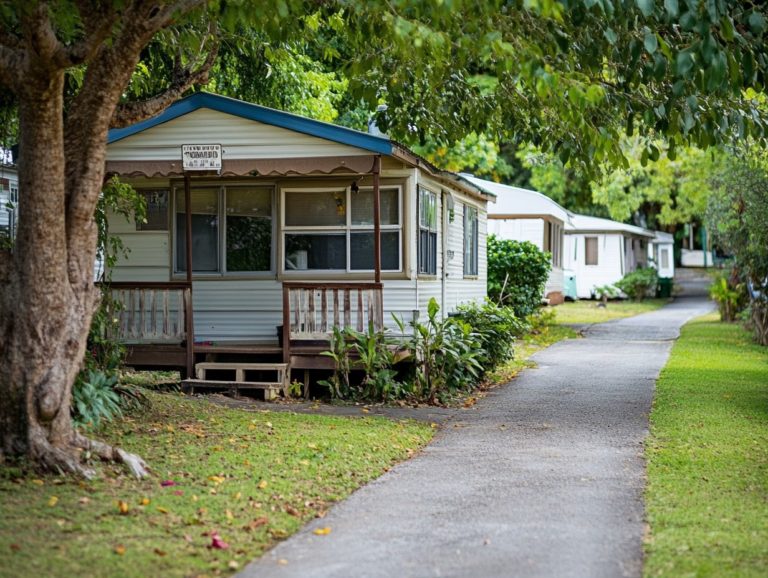The Importance of Personal Injury Protection Coverage
Personal Injury Protection (PIP) coverage is a crucial element of auto insurance that often escapes attention. It acts as your financial safety net, offering assistance for medical expenses, lost wages, and certain non-medical costs following an accident, regardless of who is at fault.
Understanding the requirements across states is vital for making informed choices about your coverage. This article will explore what PIP coverage entails, its benefits, when it becomes necessary, and tips for selecting the ideal policy tailored to your needs.
Discover how PIP can provide you with peace of mind on the road.
Contents
- Key Takeaways:
- Understanding Personal Injury Protection (PIP) Coverage
- Benefits of Having PIP Coverage
- When is PIP Coverage Necessary?
- The Importance of Personal Injury Protection Coverage
- How to Choose the Right PIP Coverage
- Frequently Asked Questions
- What is Personal Injury Protection (PIP) coverage and why is it important?
- Is PIP coverage mandatory in all states?
- What does PIP coverage typically cover?
- How does PIP coverage differ from other types of insurance?
- Do I need PIP coverage if I already have health insurance?
- How much PIP coverage should I have?
Key Takeaways:

- Personal Injury Protection (PIP) is a type of insurance that provides financial protection for medical expenses, lost wages, and other non-medical expenses in case of an accident.
- PIP coverage is necessary in states where it is mandatory. It may be optional in some states, but having this coverage is highly recommended for added financial security.
- When choosing PIP coverage, consider factors such as coverage limits, deductibles, and cost to select the right coverage that fits your needs and budget.
Understanding Personal Injury Protection (PIP) Coverage
Understanding Personal Injury Protection (PIP) coverage is essential for every driver to stay safe on the road! It plays a vital role in no-fault insurance systems in states like New Jersey and Florida.
PIP coverage is designed to protect you and your passengers in the unfortunate event of an automobile accident, ensuring medical expenses, lost wages, and related costs are covered, regardless of fault.
It’s important to understand how PIP policies work alongside your existing health insurance and liability coverage. Being aware of different coverage requirements helps you make informed decisions about your insurance needs.
What is PIP Coverage?
PIP coverage is a type of automobile insurance that provides financial compensation for medical expenses and other costs arising from accident-related injuries, regardless of who caused the accident.
This means your essential medical expenses are covered whether or not the driver was negligent. This can include hospital bills, surgical costs, rehabilitation expenses, and even lost wages while you re recovering. PIP also covers ancillary costs, such as transportation expenses for medical appointments and, in unfortunate situations, funeral costs.
Unlike general liability insurance, which focuses on damages you may cause to others, PIP zeroes in on your personal medical needs. This coverage ensures you can access timely care without the overwhelming burden of out-of-pocket expenses.
How Does it Work?
PIP coverage acts as your immediate financial lifeline after an automobile accident, allowing you and your passengers to file claims with your insurance company to recover costs for medical expenses and lost wages.
To start the claims process, promptly notify your insurance provider, usually within a specified timeframe following the accident. Gather documentation like medical records, proof of lost wages, and a thorough account of the incident to support your claims.
The insurance company will evaluate the validity of your claims and determine the compensation you deserve. Be aware that your coverage limits can significantly impact the benefits you receive, meaning you might be reimbursed only up to a certain amount based on your policy terms. Understanding these nuances can make all the difference in navigating this process effectively.
Benefits of Having PIP Coverage
The benefits of securing Personal Injury Protection (PIP) coverage are substantial. It provides essential financial safeguards for medical expenses, lost wages, and occasionally even non-medical costs tied to accident-related injuries. Understanding personal injury protection coverage can help you make informed decisions about your insurance needs.
This coverage allows you to recover efficiently without the burden of financial stress. Don t wait until an accident happens understand your PIP coverage today!
Financial Protection for Medical Expenses

One of the key benefits of Personal Injury Protection (PIP) coverage is the financial protection it offers for medical expenses arising from accident-related injuries. These costs can be significant and often surpass the limits of standard health insurance plans.
This type of coverage addresses a range of expenses, such as hospital bills that can pile up rapidly after an emergency and extensive rehabilitation costs for physical therapy. Ongoing medical care needed for a full recovery is also included. It s essential to grasp the specific limits of this coverage, as it typically complements your existing health insurance, ensuring you won t face overwhelming out-of-pocket costs.
By understanding what PIP covers, you can maximize your benefits and strategically plan for any potential financial burdens that may follow an accident.
Lost Wages Coverage
Lost wages coverage under PIP allows you to receive compensation for income lost due to a temporary inability to work after an accident. This coverage provides significant financial relief during your recovery.
It becomes essential when you find yourself sidelined from your job, helping to ease the financial strain that accompanies lost earnings while you heal. To be eligible, you typically need to provide documentation that demonstrates the accident’s impact on your ability to work, such as medical records or statements from your employer.
Compensation is generally calculated based on your average weekly wage, with specific guidelines determining the percentage covered. You can often claim benefits for a fixed duration, ensuring that you have the support needed as you navigate your recovery journey.
Ultimately, having this coverage is crucial for preserving your financial stability and helping you avoid falling into deeper debt during a challenging time.
Additional Coverage for Non-Medical Expenses
In addition to medical expenses, PIP coverage often extends to non-medical expenses. This includes essential services like childcare and household assistance. This creates a complete support system for you as you recover from accident-related injuries.
These non-medical costs significantly ease your financial burden during a challenging time. They allow you to focus solely on your recovery without the added stress. For instance, if you find yourself unable to care for your children or manage household chores due to injuries sustained in an accident, PIP can help cover the expenses of hiring someone to assist you or obtaining childcare services.
This not only facilitates a smoother recuperation process but also enhances your overall quality of life during recovery. Therefore, being well-informed about the full range of services offered under PIP is crucial. It gives you the power to maximize your coverage, ultimately safeguarding your financial well-being.
When is PIP Coverage Necessary?
PIP coverage becomes essential in specific situations, especially in states where it s mandated by law, like Florida and New Jersey. In other states, however, it may serve as an optional add-on, contingent upon the auto insurance requirements established by state governments.
Mandatory PIP Coverage States
In mandatory PIP coverage states like Florida and New Jersey, you’re legally obligated to carry a minimum amount of Personal Injury Protection insurance. This ensures that all accident-related medical expenses are covered for both you and your passengers.
This essential requirement acts as a financial safety net, covering medical costs regardless of who is at fault in an accident. In such states, you’ll typically need to maintain a specific coverage limit, often set at $10,000 or more, depending on local laws. Failing to comply with these rules can lead to significant penalties, including fines and even the potential suspension of your driver’s license.
These regulations don t just affect individual drivers; they also significantly shape the auto insurance landscape. Insurance companies respond by crafting tailored policies that meet the unique demands of these states, ultimately influencing premium pricing and local market competition.
The Importance of Personal Injury Protection Coverage
When it is Optional

In states where PIP coverage is optional, you can decide whether to include it in your auto insurance policy. Your choice varies based on your circumstances and the offerings from different insurance companies.
This decision often depends on factors like your personal financial situation, the extent of your health insurance coverage, and how much risk you’re comfortable with regarding potential medical expenses after an accident. Insurance companies play a crucial role in shaping these choices by presenting PIP options with various benefits and premiums.
As you weigh the advantages like quicker access to medical payments and coverage for lost wages against the risks of inadequate coverage, these factors will significantly shape your choices!
Ultimately, as you explore your insurance options, the perceived necessity and value of PIP coverage will guide your final decision.
How to Choose the Right PIP Coverage
Selecting the right PIP coverage requires thoughtful consideration of several key factors, including cost, coverage limits, and the unique offerings from various insurance companies.
By evaluating these elements, you can choose a plan that aligns perfectly with your needs and financial circumstances.
Factors to Consider
When selecting PIP coverage, consider your individual health status, the likelihood of sustaining injuries in an accident, and the specific terms offered by different insurance companies. This will help you choose the most suitable policy for your needs.
Your personal circumstances like lifestyle choices, occupation, and even family health history play a significant role in your decisions. Understanding premiums, deductibles (the amount you pay out-of-pocket before insurance kicks in), and potential out-of-pocket costs is essential for anyone mindful of their budget.
The offerings from insurance companies can vary greatly; some may provide more comprehensive benefits or unique coverage options tailored to specific needs. By carefully weighing these factors, you can arrive at a well-informed decision that balances protection with affordability.
Cost and Coverage Limits
Understanding the costs and coverage limits associated with PIP coverage is essential. These elements directly impact your overall insurance premiums and the level of financial protection you can expect in the event of an accident.
The connection between what you pay for a policy and the available coverage limits can often feel like a puzzle. Different insurance companies adopt varied pricing structures, meaning the same level of coverage might come with different price tags depending on the insurer.
Factors such as deductibles, coverage amounts, and even regional nuances can significantly influence the price. If you’re looking to secure adequate coverage, comparing multiple insurance quotes is vital. This ensures you’re receiving necessary protection without unnecessary financial strain from inflated premiums.
Frequently Asked Questions
What is Personal Injury Protection (PIP) coverage and why is it important?

PIP coverage is a type of insurance that provides financial protection for medical expenses, lost wages, and other related costs in the event of an injury sustained in a car accident. It ensures that you and your passengers are covered for any personal injuries, regardless of who is at fault.
Is PIP coverage mandatory in all states?
No, PIP coverage is not mandatory in all states. However, some states require drivers to carry PIP coverage as part of their auto insurance policy. It’s important to check your state’s laws and requirements regarding PIP coverage.
Ready to explore your options? Let s dive in!
What does PIP coverage typically cover?
PIP (Personal Injury Protection) coverage includes medical expenses and lost wages. It may also cover funeral and childcare costs.
How does PIP coverage differ from other types of insurance?
PIP coverage is different from liability insurance. It pays for your injuries, no matter who caused the accident.
Do I need PIP coverage if I already have health insurance?
Yes, it’s essential to have PIP coverage, even with health insurance. Health insurance may not cover all expenses from a car accident.
How much PIP coverage should I have?
How much PIP coverage you need varies based on your state’s requirements and your finances. Discuss your options with your insurance provider today!





